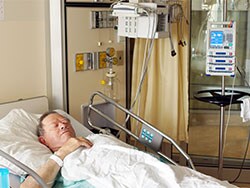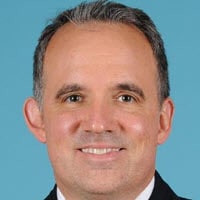The American Thoracic Society (ATS) does an excellent job of emphasizing the importance of sleep medicine. On the heels of their research statement on cancer fatigue, they've issued another on sleep and circadian disorders (SCD) in the intensive care unit . While the authors acknowledge that the field is short on definitive outcome studies, the link between sleep and recovery has enough biologic plausibility to support a third-party candidate for president. There's no denying its importance.

But sleep largely depends on behavior and environment, and changes to either don't come easily. This is particularly true in the ICU, where good "sleep hygiene" is impossible, interruptions are constant, and artificial light is ubiquitous. It doesn't help that the critically ill are managed by large, complex teams that have little training in sleep medicine and even less awareness of their individual patients' sleep needs.
Wouldn't it be nice if we had a medication that was cheap, low risk, and easy to administer that would "fix" SCD in the ICU? Much of the data on pharmacologic treatment (or prevention) of SCD in the critically ill come from a mixture of sedation and delirium prevention studies, where sleep is often an afterthought. Delirium reduction has garnered more attention than sleep improvement, with the latter a focus only to the extent that it may improve the former.
The major pharmacologic players in this space seem to be ramelteon, melatonin, quetiapine, and dexmedetomidine. In small randomized trials that included a total of only 24 ICU patients, ramelteon has improved sleep and reduced delirium. Melatonin and quetiapine have their supporters and are commonly prescribed, though it's not clear why. They're cheap and relatively innocuous at typical doses but their efficacy in the ICU is unclear.
Dexmedetomidine seems to be the latest darling. A new randomized controlled trial published online in eClinicalMedicine (part of The Lancet Discovery Science) reports that a short infusion — 1 µg/kg over 40 minutes, to be exact — is enough to reduce postoperative delirium in older patients undergoing nonemergent cardiac bypass surgery. I was surprised that it was administered for such a short time, given that other studies I'd read continued their infusions all night. The authors based the dosing on that of a previous study performed in healthy volunteers. With this simple, brief, low-risk intervention, the authors were able to show a reduction in delirium on postoperative day 1.
The first large studies of dexmedetomidine were published back in 2007 and 2009, and since then, its adherents have been pushing the sleep angle. The 2009 JAMA study made an offhand remark about dexmedetomidine preserving biologic sleep. I got so excited reading this (I was finishing my sleep fellowship at the time) that I pulled the reference they cited. Turns out it was a rat study I would label intriguing at best. When two subsequent studies showed no improvements in N3 and little to no REM sleep with dexmedetomidine, I concluded that it was just like any other GABA-agent: It increases N2 but not deep sleep or REM.
Deciding how and when to use dexmedetomidine remains challenging. There's a reasonable debate about whether it's the agent of choice for those who require continuous sedation. After all, studies of dexmedetomidine all night do show some N3 sleep and a little REM, which I'd argue is better than propofol or benzodiazepines. There's also the potential for improvements in delirium. Unfortunately, this sleep-delirium benefit hasn't translated to better outcomes in larger randomized controlled trials. In fact, the SPICE III trial found an increase in 90-day mortality in younger participants (age < 63.7 years old) that was related to increasing dexmedetomidine infusion rates in a post-hoc analysis. Last, it remains on patent, so cost favors other agents.
Do we have enough data to recommend preemptive dexmedetomidine to improve sleep and reduce delirium in patients who don't require continuous sedation? Hard to say. The existing data were recently summarized in a meta-analysis. Awash in heterogeneity, bias, and every other statistical limitation imaginable, this study found little to support dexmedetomidine. I suppose I could get on board with a brief, 40-minute infusion for patients otherwise at high risk for delirium or sleep disruption, given cost and side effects. Still, there are cheaper sleep aids that could achieve similar results.
In summary, reducing SCD in the ICU should be a top priority. There are environmental and behavioral changes worth pursuing. The ATS research statement should bring more attention to this area and remind intensivists that sleep promotion should be a goal in and of itself, not simply a method employed to reduce delirium. I wish I believed that dexmedetomidine (or any other drug, for that matter) is the answer, but I don't. I'm not confident that we know exactly where and when to use dexmedetomidine.
Aaron B. Holley, MD, is a professor of medicine at Uniformed Services University in Bethesda, Maryland, and a pulmonary/sleep and critical care medicine physician at MedStar Washington Hospital Center in Washington, DC. He covers a wide range of topics in pulmonary, critical care, and sleep medicine.
Follow Medscape on Facebook, Twitter, Instagram, and YouTube
Credits:
Lead image: Mirage3|Dreamstime.com
Image 1: Mirage3|Dreamstime.com
Medscape Critical Care © 2023 WebMD, LLC
Any views expressed above are the author's own and do not necessarily reflect the views of WebMD or Medscape.
Cite this: Sleep, Circadian Rhythms, Delirium, and the ICU - Medscape - May 08, 2023.












Comments